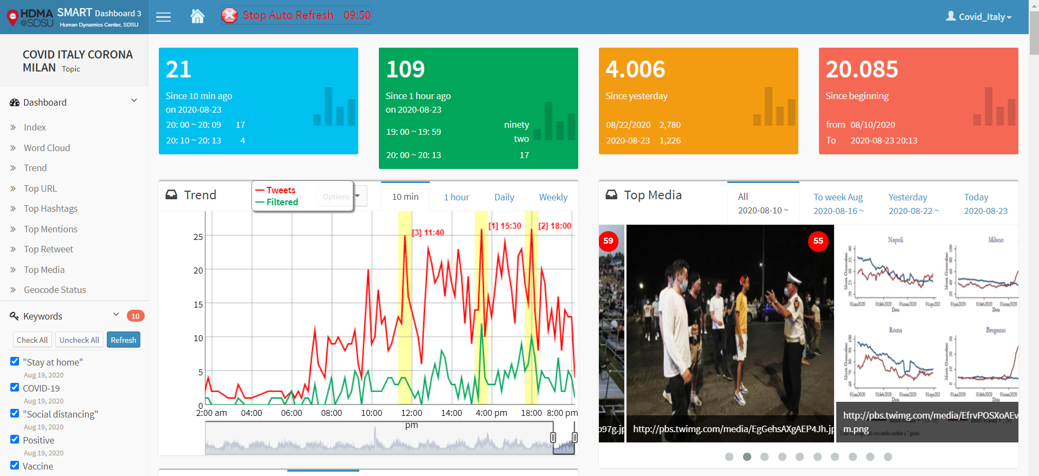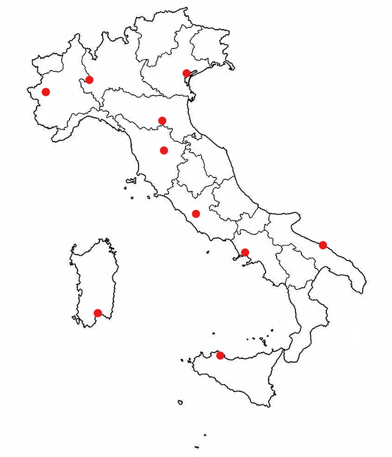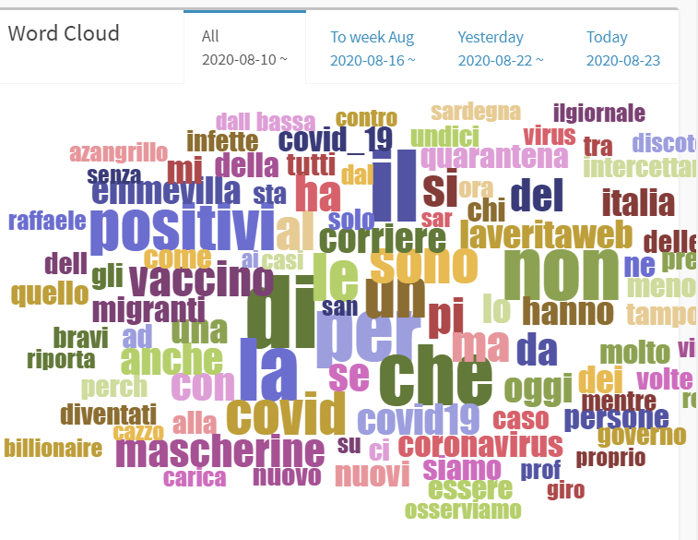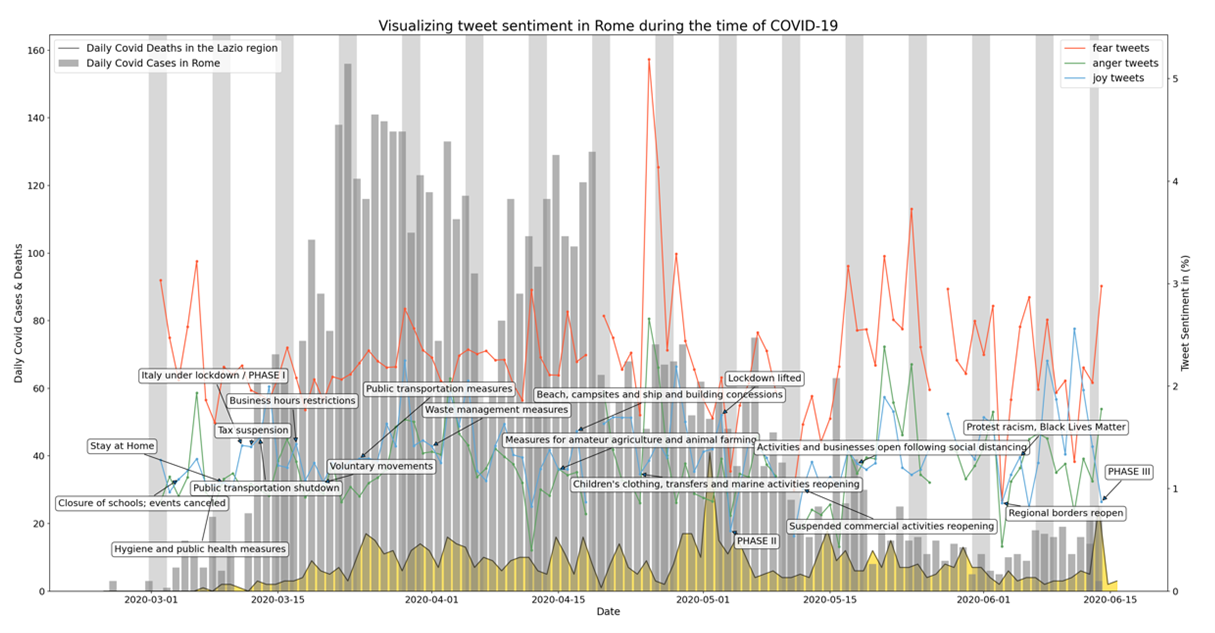Health, Well-Being, and Demography
Social response to Covid-19: Sentiment analysis and SMART Dashboard
Respuesta Social al Covid-19: Análisis de Sentimiento y Panel Inteligente







SDGs Addressed | ODS Abordados
The 5P Dimensions of the SDGs | Las 5P Dimensiones de los ODS
Planet
People
Peace
The pandemic spread rapidly across Italy putting the region’s health system on the brink of collapse, highlighting the government’s capacity to respond to citizens. Ten dashboards provided an aggregated view of what people across Italy tweet during the pandemic by monitoring social media real-time behaviors across geographies.
La pandemia se propagó rápidamente por Italia, poniendo el sistema de salud de la región al borde del colapso, lo que pone de relieve la capacidad del gobierno para responder a los ciudadanos. Diez paneles proporcionaron una vista agregada de lo que las personas en Italia tuitearon durante la pandemia al monitorear los comportamientos de las redes sociales en tiempo real en diferentes geografías.
This project performed two studies on 10 metropolitan cities of Italy in the north (Milan, Venice, Turin, & Bologna), center (Florence & Rome), south (Naples & Bari), and Islands (Palermo & Cagliari), and used machine learning techniques during Phase 0, I, II, and III (defined by the Italian goverment) of the pandemic during March 2020 to December 2020; (1) Sentiment analysis models on fear, anger, and joy were developed using over 4 million Covid-related Tweets. Findings showed an assortment of differences and connections across Twitter sentiments on policy measures, Covid cases/deaths, and geographies. (2) SMART geo-targeted search tools for Twitter messages were developed employing selected keywords to monitor the diffusion of information and social behavior changes during Covid-19. The dashboards (one per city) provide an automatic procedure to associate tweets based on geography differences, filter noises, remove redundant retweets, use machine learning methods to improve precisions, and analyze social media data from a spatial-temporal perspective.
Este proyecto realizó dos estudios en 10 ciudades metropolitanas de Italia en el norte (Milán, Venecia, Turín y Bolonia), el centro (Florencia y Roma), el sur (Nápoles y Bari) y las islas (Palermo y Cagliari), aplicando técnicas de aprendizaje automático durante la Fase 0, I, II y III (definida por el gobierno Italiano) de la pandemia durante Marzo de 2020 a Diciembre de 2020; (1) Se desarrollaron modelos de análisis de sentimientos sobre el temor, el coraje, y la alegría utilizando más de 4 millones de tuits relacionados con Covid. Los hallazgos mostraron una variedad de diferencias y conexiones entre los sentimientos de Twitter sobre medidas políticas, casos/muertes de Covid por geografía. (2) Se desarrollaron herramientas de búsqueda SMART orientadas geográficamente para mensajes de Twitter empleando palabras clave seleccionadas para monitorear la difusión de información y los cambios de comportamiento social durante el Covid-19. Los tableros (uno por ciudad) brindan un procedimiento automático para asociar tweets en función de diferencias geográficas, filtrar ruidos, eliminar retweets redundantes, usar métodos de aprendizaje automático para mejorar la precisión y analizar datos de redes sociales desde una perspectiva espacio-temporal.
Consortium | Consorcio
Dr. Gabriela Fernandez (Metabolism of Cities Living Lab, US), Karenina Zaballa (MS Big Data Analytics and Metabolism of Cities Living Lab, US), Harrison Yang (MS Big Data Analytics and Metabolism of Cities Living Lab, US), Dr. Chanwoo Jin (Geography and Metabolism of Cities Living Lab, US), Rachelle De Ocampo (MS Public Health and Metabolism of Cities Living Lab, US), Wayne Kepner (MS Public Health and Metabolism of Cities Living Lab, US), Dr. Ming-Hsiang Tsou (Metabolism of Cities Living Lab, US), Dr. Brian H. Spitzberg (Communications and Metabolism of Cities Living Lab, USA), Carol Maione (Politecnico di Milano, Italy), Dr. Filippo Bonora (University of Bologna and Crowdfight Covid-19, Italy), Dr. Shraddha Ghodke (University of College London and Crowdfight Covid-19, UK), Jack McKew (AECOM and Crowdfight Covid-19, Australia), Norbert Bonnici (Malta Critical Infrastructure Protection Directorate and Crowdfight Covid-19, Malta), and Dr. Jarai Carter (Columbia University, Smart Lab, Procter & Gamble and Crowdfight Covid-19, US). Special thanks to Crowdfight Covid-19.
Dra. Gabriela Fernandez (Living Lab de Metabolism of Cities, EE. UU.), Karenina Zaballa (MS Big Data Analytics and Metabolism of Cities Living Lab, EE. UU.), Harrison Yang (MS Big Data Analytics and Metabolism of Cities Living Lab, EE. UU.), Dr. Chanwoo Jin (Living Lab de Geografía y Metabolismo de las Ciudades, EE. UU.), Rachelle De Ocampo (Living Lab de MS en Salud Pública y Metabolismo de las Ciudades, EE. UU.), Wayne Kepner (Living Lab de MS en Salud Pública y Metabolismo de las Ciudades, EE. UU.), Dr. Ming -Hsiang Tsou (Metabolism of Cities Living Lab, EE. UU.), Dr. Brian H. Spitzberg (Comunicaciones y Metabolismo de Cities Living Lab, EE. UU.), Carol Maione (Politecnico di Milano, Italia), Dr. Filippo Bonora (Universidad de Bolonia y Crowdfight Covid-19, Italia), Dr. Shraddha Ghodke (University of College London y Crowdfight Covid-19, Reino Unido), Jack McKew (AECOM y Crowdfight Covid-19, Australia), Norbert Bonnici (Dirección de Protección de Infraestructuras Críticas de Malta y Crowdfight Covid-19, -19, Malta) y el Dr. Jarai Carter (Universidad de Columbia, Smart Lab, Pr octer & Gamble y Crowdfight Covid-19, EE. UU.). Un agradecimiento especial a Crowdfight Covid-19.